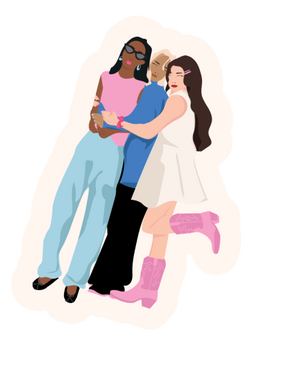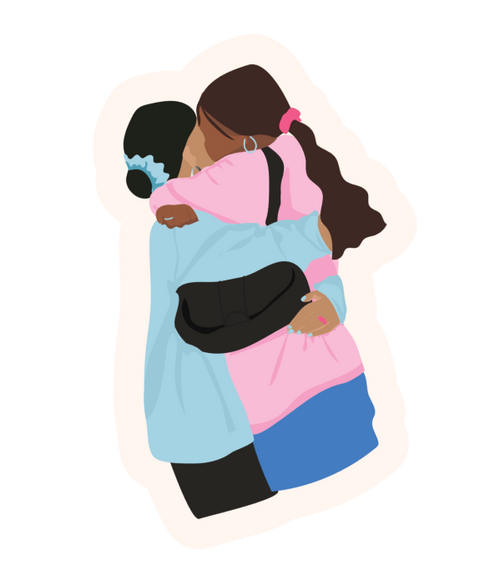What happens after you leave rehab? Tips for you and your loved ones

Over a month ago, my mum came out of rehab. It would have been really handy if she walked out with a leaflet in her hand; a leaflet that is much like “What To Expect When You’re Expecting” except it is entitled “What To Expect When You Are Absolutely Clueless” – but we did not. And I really wish we did – which is why I’m sat here, at 6:26pm on a Tuesday evening, writing this piece.
I had fully intended to write this piece by myself – but, when I told my mum what I was working on we both decided it made much more sense to work together on this. A lot of this journey can feel isolating, on both sides, but so much of recovery also relies on rebuilding a healthy form of communication. This isn’t a story with one perspective, it’s not even story with two perspectives – addiction affects everyone it touches and I thought it much better, especially when it comes to breaking down stigma, if we let every voice be heard.
So, here we are – our tips on leaving rehab, from myself and my mum.
Mum’s tips – for individuals leaving rehab
1. Leaving rehab can be lonely… find a sponsor.
Rehab taught me that addiction is an illness – which is something I had never believed. After all, it is very easy to talk about it as self inflicted, which it is to a degree, but have you ever watched Pinocchio? Think of Jiminy Cricket sat on his shoulder, his voice of right and wrong… Addiction means that whilst we all have our own Jiminy Cricket, we also have his evil twin sat on our opposite shoulder. So, on leaving rehab I realised we all have a demon or angel sat with us.
Rehab is a bubble of like minded people from all walks of life – but, everyone relates to each other. You share classes, therapy groups, war stories and, crucially, you feel a sense of belonging. Within a very short space of time, you know more about the people around you than the friends who have been on your Christmas card list for the last 30 years. But then you leave… and now you have to blend in. It isn’t as easy and they told us that, but it’s one thing being told and another thing experiencing it. It’s a reality shock and it’s lonely – but, there is always always always someone you can call from your new found best friends and more locally, find that sponsor. They are your safety blanket. Just be careful of finding the right one – and let go of the fact that you need to do all of the hard work by yourself. You may need to get yourself over the finishing line, but it doesn’t need to be lonely.
2. Routine, routine, and guess what, more routine
Rehab is a day scheduled out for you – it gets you out of bed early, it gets you into meditation and affirmations, it gets you into knowing what you’re doing when. That’s harder to have when you leave – so it’s on you to make your own. My tip is to make time for your recovery – normal life is important but your recovery is a priority too.
3. You go to rehab so you can change – but the people and environment around you need to change too.
A lot of what you learn in rehab is that yesterday and tomorrow doesn’t matter – you have to live in the present. This can be hard though; especially when those around you are still worried about yesterday. It can be frustrating when you feel like all of your energy is being put into the future and those around you are dragging you into past mistakes – but, if you come from a place of empathy and calmly explain how you’re feeling and what you need help with, you can work together to stay on the path you need to be on.
4. 90 meetings in 90 days.
I’m midway through the 90 meetings in 90 days challenge. The idea isn’t that you do one every day, you can do a few in one day, so long as you have done 90 meetings by the time 90 days are out. It helps you meet new people; it helps you remember why you’re doing this and, there will be days that are hard, that you want to drink, but they help you remember why you’re not – or to get back on track when you need. You can find all of the meetings using the Alcoholics Anonymous website and a lot of them are online now. My top tip is to write down the ones that you like the most so that you can make it part of your routine and you don’t end up skipping days because you can’t find one that works with your schedule last minute.
However, this is where the honesty card comes in. I have blipped/slipped up/fucked up whatever you call it twice in the 2 months since leaving rehab. The evil Jiminy Cricket won and, worst of all, I can’t explain how I let him. When you slip up, it also means that the 90 in 90 has to restart but, seeing how much comfort you get from the meetings, it’s hardly a punishment. The guilt and disappointment of those you love is the punishment – and the motivator to keep going.
5. “Service provides an opportunity to get out of ourselves and think of others.”
Don’t run before you can walk – but volunteering could be part of your therapy, as well as helping a fellow addict along the way. It’s very common for a lot of people on their sobriety journey to start volunteering and pass on their knowledge. This happens for two reasons. Firstly, it’s empowering – you’re learning to give back and you can feel helpful. Secondly, to put it bluntly, it’s a distraction. When you’re helping someone else, you’re not thinking of the devil on your shoulder.
My tips – for families and loved ones
1. The first rules of dependency & family club is… everything is confusing and you will feel confused
I am exaggerating a point here for the Fight Club fans out here, but in all seriousness – it is hard. There is no manual but it really feels like there should be. My mum’s point about people needing to adjust is true. It’s a hard pill to swallow and it needs to be explained by the individual with a dependency with a lot of sensitivity and understanding, but you will need to change for this to work too. One of the rules of Al-Anon (which is a group for family members of alcoholics) is “Do not do for others what they should do for themselves” – and personally I find this such a revealing glimpse into the general mindset of loved ones of addicts.
You want to jump in and divert the crisis before the crisis happens; if you grow up with it your whole personality can become tailored to the one question “what should I do?” – but right now, you don’t need to do anything. You just need to BE. Which is confusing. It’s a very weird place to be. Your saviour-complex that you learnt isn’t going to help anymore. Much like the anger that you may have built up too – or the trust issues.
You are totally totally totally justified in feeling that way – but the sad truth is that it needs to be a group effort. Try to react to the situation as they happen rather than the expectations you have in your head. Build trust, bite back any retorts, don’t try to give the pep talks of your life time. Just think, whatever role I inhabited before, ask yourself – does this serve any of us any more?
2. And related to this… why am I feeling a weird sense of LOSS?
There’s this meme of Hilary Clinton walking up some plane stairs. She turns to the camera and just shrugs her shoulder. The caption of said meme was “When your week is going to shit and something else happens.” That was how I felt when my mum came back and appeared to be healthy, not pressing self destruct and my life was edging dangerously close to the word “normal”…and then I decided to feel sad about it. But, “what”, my brain told me, “if she doesn’t need you anymore?”. “What if”, it sidled up to me and whispered, “if the love you shared was dependent on you helping her addiction?”.
All fascinating points brain – but all wrong. It’s understandable that you grew used to your role but take the redundancy packet and smile. This is your opportunity to rewrite this; to get rid of what didn’t serve either of you and, in its place, grow a relationship that soothes you both.
3. I know its impossibly shit, but let's talk relapses
I tried in every which way possible to mentally prepare myself for a relapse. I did a pretty good job at it too – I even had myself convinced… and then it happened and I punched a wall. In that moment that I found out, the rug had been pulled from my feet and then set on fire. I panicked like I had never panicked in my life. To speak plainly, I was heartbroken. I felt doomed – and sometimes I still do. I worry that my life is just the way it is, that I will never be free of worry, and I have to deal with that. The truth is somewhere between those two states of mind.
Rehab isn’t a magic wand; it’s a journey – and for a lot of people, leaving rehab may not be the start of a lifetime of sobriety. It’s more gradual and more wonky. I asked Mum after if relapse was common and she told me that 9 out of her group had already relapsed – which puts it into perspective I felt. I’m not saying it doesn’t hurt and this is not me dishing out proper advice because I am still trying to figure this out but I thought it was better for you to know it does happen, importantly, and it’s not the end.
TIP FOR THE INDIVIDUAL WITH THE DEPENDENCY: We don’t need perfection, but we do need honesty. If you mess up, tell us. You’ll be surprised how much pain you save us from.
4. Get chatting
The hardest thing I’ve ever learnt is that I have boundaries – and that I had to communicate them. It felt harsh – but I’ve learn that the more you look after yourself, the more that those around you look after themselves too. Saying that, this journey doesn’t have to be done away from each other. In fact, I don’t think it should be. You can both ask for help when you need. You’ll both get sad when you need. You’ll both get really bloody angry when you need to – but, whatever you do, you can do it together.
5. Get involved with your own meetings
This is time to look after yourself too. Just like they have meetings where they find a group of people who understand, you can do the same for yourself. It’s the same system where you can find online meetings and try out different ones that work for you. Just go to Al-Anon's website.
Written by Anonymous











